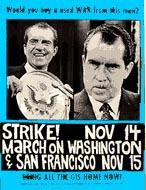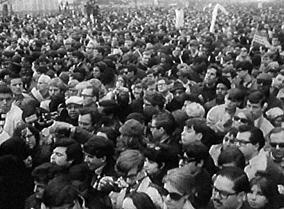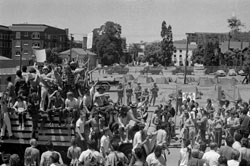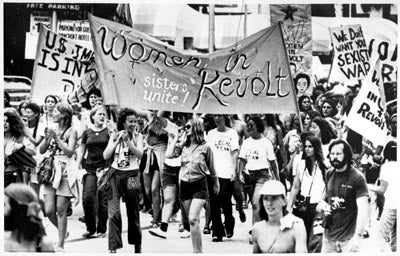
Phil Ochs spring 1965, Berkeley campus

Now if this picture just doesnt bring it on home for you-- I dunno--

Northeastern Students Protesting America's Conflict with Vietnam, 1969
1963, A Monk in Viet NAM--



Washington DC Febuary 15th, 1969
NYT--

Announcer at Woodstock: Ladies and gentlemen...
Country Joe...McDonald....
Oh, come on all of you big strong men,
Uncle Sam needs your help again,
Got himself in a terrible jam,
Way down yonder in Vietnam,
Put down your books, pick up a gun,
We�re gonna have a whole lot of fun,
And it�s one, two three, what are we fightin for,
Don�t ask me, I don�t give a damn, next stop is Vietnam.
Whoopee! We�re all gonna die.

National Guardsmen stand guard on the other side of a steel mesh fence erected May 15, 1969 by University of California officials around a "People's Park" at Berkeley, Calif., while some of the thousands who marched in protest pass by. The fencing precipitated a riot in which police fired shotguns at demonstrators and one person was wounded fatally. Governor Reagan then ordered the guardsmen into the city. (AP Photo/files)
January 1, 1969 - Henry Cabot Lodge, former American ambassador to South Vietnam, is nominated by President-elect Nixon to be the senior U.S negotiator at the Paris peace talks.
January 20, 1969 - Richard M. Nixon is inaugurated as the 37th U.S. President and declares "...the greatest honor history can bestow is the title of peacemaker. This honor now beckons America..." He is the fifth President coping with Vietnam and had successfully campaigned on a pledge of "peace with honor."
January 22, 1969 - Operation Dewey Canyon, the last major operation by U.S. Marines begins in the Da Krong valley.
January 25, 1969 - Paris peace talks open with the U.S., South Vietnam, North Vietnam and the Viet Cong all in attendance.
February 23, 1969 - Viet Cong attack 110 targets throughout South Vietnam including Saigon.
February 25, 1969 - 36 U.S. Marines are killed by NVA who raid their base camp near the Demilitarized Zone.
March 4, 1969 - President Nixon threatens to resume bombing North Vietnam in retaliation for Viet Cong offenses in the South.
March 15, 1969 - U.S. troops go on the offensive inside the Demilitarized Zone for the first time since 1968.

See the poster (middle of pic) that says-- war is not healthy for children and other living things--

heres the poster-


March 1969 - Letters from Vietnam veteran Ronald Ridenhour result in a U.S. Army investigation into the My Lai massacre.
March 17, 1969 - President Nixon authorizes Operation Menu, the secret bombing of Cambodia by B-52s, targeting North Vietnamese supply sanctuaries located along the border of Vietnam.
April 9, 1969 - 300 anti-war students at Harvard University seize the administration building, throw out eight deans, then lock themselves in. They are later forcibly ejected.
April 30, 1969 - U.S. troop levels peak at 543,400. There have been 33,641 Americans killed by now, a total greater than the Korean War.
May 1969 - The New York Times breaks the news of the secret bombing of Cambodia. As a result, Nixon orders FBI wiretaps on the telephones of four journalists, along with 13 government officials to determine the source of news leak.
May 10-May 20 - Forty-six men of the 101st Airborne die during a fierce ten-day battle at 'Hamburger Hill' in the A Shau Valley near Hue. 400 others are wounded. After the hill is taken, the troops are then ordered to abandon it by their commander. NVA then move in and take back the hill unopposed.
The costly assault and its confused aftermath provokes a political outcry back in the U.S. that American lives are being wasted in Vietnam. One Senator labels the assault "senseless and irresponsible."
It is the beginning of the end for America in Vietnam as Washington now orders MACV Commander Gen. Creighton Abrams to avoid such encounters in the future. 'Hamburger Hill' is the last major search and destroy mission by U.S. troops during the war. Small unit actions will now be used instead.
A long period of decline in morale and discipline begins among American draftees serving in Vietnam involuntarily. Drug usage becomes rampant as nearly 50 percent experiment with marijuana, opium, or heroin which are easy to obtain on the streets of Saigon. U.S. military hospitals later become deluged with drug related cases as drug abuse causalities far outnumber causalities of war.
May 14, 1969 - During his first TV speech on Vietnam, President Nixon presents a peace plan in which America and North Vietnam would simultaneously pull out of South Vietnam over the next year. The offer is rejected by Hanoi.

ASU women are among the protestors of the U.S. presence in Vietnam. Forty ASU students attended the Moratorium in Berkley, CA, November 1969


June 8, 1969 - President Nixon meets South Vietnam's President Nguyen Van Thieu at Midway Island and informs him U.S. troop levels are going to be sharply reduced. During a press briefing with Thieu, Nixon announces "Vietnamization" of the war and a U.S. troop withdrawal of 25,000 men.
June 27, 1969 - Life magazine displays portrait photos of all 242 Americans killed in Vietnam during the previous week, including the 46 killed at 'Hamburger Hill.' The photos have a stunning impact on Americans nationwide as they view the once smiling young faces of the dead.
July 1969 - President Nixon, through a French emissary, sends a secret letter to Ho Chi Minh urging him to settle the war, while at the same time threatening to resume bombing if peace talks remain stalled as of November 1. In August, Hanoi responds by repeating earlier demands for Viet Cong participation in a coalition government in South Vietnam.
July 8, 1969 - The very first U.S. troop withdrawal occurs as 800 men from the 9th Infantry Division are sent home. The phased troop withdrawal will occur in 14 stages from July 1969 through November 1972.
July 17, 1969 - Secretary of State William Rogers accuses Hanoi of "lacking humanity" in the treatment of American POWs.
July 25, 1969 - The "Nixon Doctrine" is made public. It advocates U.S. military and economic assistance to nations around the world struggling against Communism, but no more Vietnam-style ground wars involving American troops. The emphasis is thus placed on local military self-sufficiency, backed by U.S. air power and technical assistance to assure security
 http://www.ilkahartmann.com/members/jbrave/phototext.nsf/images/BE18B166954B14DE88256DB800633273/
http://www.ilkahartmann.com/members/jbrave/phototext.nsf/images/BE18B166954B14DE88256DB800633273/$FILE/VDC_internationial_Days_Of_Protest_Button.jpg





1967 @ the Pentagon
July 30, 1969 - President Nixon visits U.S. troops and President Thieu in Vietnam. This is Nixon's only trip to Vietnam during his presidency.
August 4, 1969 - Henry Kissinger conducts his first secret meeting in Paris with representatives from Hanoi.
August 12, 1969 - Viet Cong begin a new offensive attacking 150 targets throughout South Vietnam.
September 2, 1969 - Ho Chi Minh dies of a heart attack at age 79. He is succeeded by Le Duan, who publicly reads the last will of Ho Chi Minh urging the North Vietnamese to fight on "until the last Yankee has gone."
September 5, 1969 - The U.S. Army brings murder charges against Lt. William Calley concerning the massacre of Vietnamese civilians at My Lai in March of 1968
Another Monk--


Kerry & Lennon
September 16, 1969 - President Nixon orders the withdrawal of 35,000 soldiers from Vietnam and a reduction in draft calls.
October 1969 - An opinion poll indicates 71 percent of Americans approve of President Nixon's Vietnam policy.
October 15, 1969 - The 'Moratorium' peace demonstration is held in Washington and several U.S. cities.
Demonstration organizers had received praises from North Vietnam's Prime Minister Pham Van Dong, who stated in a letter to them "...may your fall offensive succeed splendidly," marking the first time Hanoi publicly acknowledged the American anti-war movement. Dong's comments infuriate American conservatives including Vice President Spiro Agnew who lambastes the protesters as Communist "dupes" comprised of "an effete corps of impudent snobs who characterize themselves as intellectuals."
November 3, 1969 - President Nixon delivers a major TV speech asking for support from "the great silent majority of my fellow Americans" for his Vietnam strategy. "...the more divided we are at home, the less likely the enemy is to negotiate at Paris...North Vietnam cannot defeat or humiliate the United States. Only Americans can do that."
November 15, 1969 - The 'Mobilization' peace demonstration draws an estimated 250,000 in Washington for the largest anti-war protest in U.S. history.
November 16, 1969 - For the first time, the U.S. Army publicly discusses events surrounding the My Lai massacre.
December 1, 1969 - The first draft lottery since World War II is held in New York City. Each day of the year is randomly assigned a number from 1-365. Those with birthdays on days that wind up with a low number will likely be drafted.
December 15, 1969 - President Nixon orders an additional 50,000 soldiers out of Vietnam.
December 20, 1969 - A frustrated Henry Cabot Lodge quits his post as chief U.S. negotiator at the Paris peace talks.
By year's end, America's fighting strength in Vietnam has been reduced by 115,000 men. 40,024 Americans have now been killed in Vietnam. Over the next few years, the South Vietnamese Army will be boosted to over 500,000 men in accordance with 'Vietnamization' of the war in which they will take over the fighting from Americans.